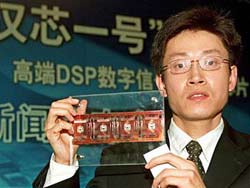China is currently shaken by a scandal involving scientific research forgery, reminiscent of the case of Professor Hwang in South Korea who fabricated stem cell research. The incident was officially confirmed on May 12.
 |
|
Tran Tien at the press conference introducing the Hanxin microchip in 2003 – Photo: AP |
Tran Tien has become a prominent figure in the Chinese scientific community in recent years. Born in 1968 in Fujian Province, Tran graduated from Donghua University in Shanghai before studying in the United States. In 1998, he obtained a Ph.D. in Information Technology from the University of Texas and worked for Motorola. In 2000, Tran decided to return to his homeland to teach at Shanghai Jiao Tong University, one of the most prestigious universities in China.
At that time, the Chinese government prioritized the development of digital signal processing chips used in electronic devices such as mobile phones and digital cameras. Previously, no company in China had successfully produced this type of microchip, and each year the Chinese technology sector spent billions of USD importing foreign products.
Tran and his team at Shanghai Jiao Tong University began their research. Just two years later, Tran announced the successful development of the Hanxin microchip, capable of processing 200 million signals per second. Tran’s invention was hailed as “a great breakthrough for Chinese technology,” potentially ending China’s dependence on foreign microchip technology.
Since then, fame and fortune have poured in for Tran, who was now seen as a source of pride for Chinese science. He was appointed head of the newly established microelectronics training school at Shanghai Jiao Tong University and led the university’s research center. Tran also received substantial funding from the Beijing government for his research.
In 2004, Tran announced the invention of the next-generation Hanxin II and III microchips with even faster processing speeds. At that time, the company he founded received orders to produce up to 3.5 million electronic microchips and secured contracts with tech giants like IBM.
Tran’s downfall began in December 2005 when some associates sent a letter to the Beijing government accusing him of fabricating research on digital signal processing microchips. One of them even posted an accusation letter online. A few weeks later, both the government and Shanghai Jiao Tong University launched an investigation.
On May 12, the entire nation was shocked when the government officially announced that Tran had falsified research and that the Hanxin microchip did not possess the features he had claimed. In fact, Tran’s deception was both simple and sophisticated: he imported microchips from Motorola and had workers replace the Motorola brand with the Hanxin label. Through this method, Tran managed to deceive the entire research assessment team of the central government.
Shanghai Jiao Tong University declared Tran’s actions as “despicable” and immediately decided to dismiss him. Beijing stated that it would never allow Tran to participate in any state research projects. The government also suspended the Hanxin microchip development project and revoked its research funding.
According to observers, Tran’s scandal has shattered the prospect of “China on the brink of a technological breakthrough” and harmed the pride of a nation determined to narrow the technological gap with the West. As of now, it remains unclear whether Tran will face criminal charges for fraud.
HIEU TRUNG


















































